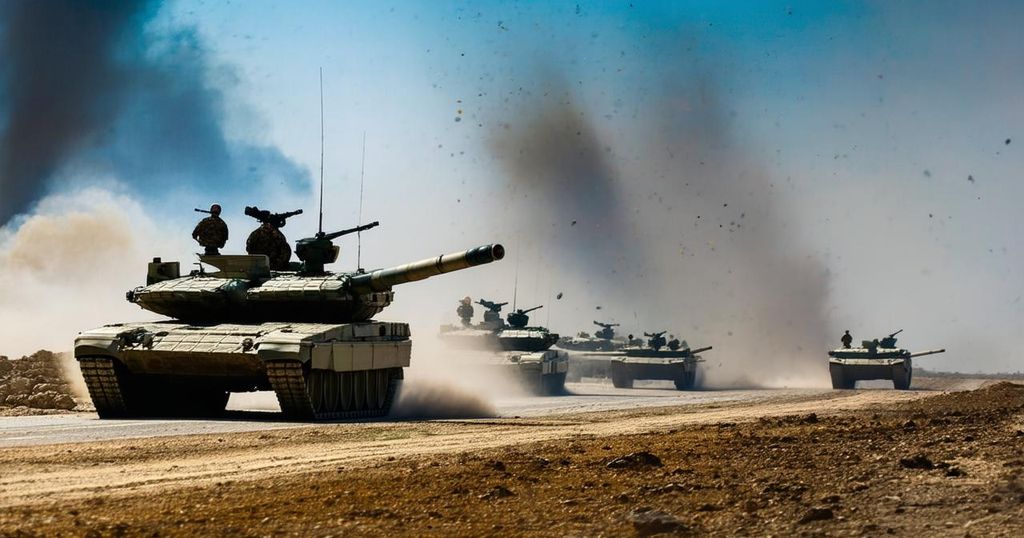Turkey retaliated against the PKK for a deadly attack on a defense factory by launching airstrikes in Kurdish-controlled areas in Syria and Iraq, leading to the death of 12 individuals, including children. The SDF condemned the strikes, asserting they targeted civilian infrastructure, while ongoing discussions aimed at resolving the PKK conflict have been referenced amid this renewed violence.
Turkey conducted airstrikes in Kurdish-held regions of Syria and Iraq as a response to a deadly assault that targeted a state-owned defense manufacturing facility in Ankara, resulting in four fatalities and several injuries. The Turkish government attributed the assault to the Kurdistan Workers’ Party (PKK), which President Recep Tayyip Erdogan labeled as a “nefarious” attack aimed at the Turkish Aerospace Industries. Following this incident, the Syrian Democratic Forces (SDF), a crucial U.S. ally in the fight against ISIS, reported that twelve individuals were killed, among them two children, with an additional twenty-five sustaining injuries from extensive Turkish bombings. Concurrently, Turkey’s defense ministry stated that they targeted forty-seven “terrorist positions” in Syria and Iraq. SDF commander General Mazlum Abdi condemned the Turkish assaults as indiscriminate and harmful to civilian infrastructure in northeastern Syria. Abdi affirmed, “We have repeatedly shown our readiness for dialogue. Meanwhile, we affirm that our forces are ready to defend our people and land.” Despite the attacks, approximately nine hundred U.S. military personnel remain in the region as part of the coalition against ISIS; however, neither the U.S. Defense Department nor the Central Command provided comments regarding the Ankara attack or Turkey’s retaliatory measures. The Turkish government considers the SDF and its affiliated civilian body, the YPG, to have direct ties with the PKK, a group designated as a terrorist organization by both Turkey and the United States. In light of these events, the ongoing dialogue between the Turkish state and PKK leader Abdullah Ocalan, incarcerated in Turkey for over two decades, remains critical, particularly as Ocalan’s nephew suggested recent openness to ending the long-standing conflict. Erdogan’s political ally had previously invited Ocalan to address parliament, hinting at a potential for his parole in exchange for a disbandment of the PKK.
The conflict involving the Kurdistan Workers’ Party (PKK) and Turkey has persisted for decades, with the PKK carrying out an insurgency against the Turkish state. The Turkish government considers the PKK as a terrorist organization; thus, actions taken against related groups, such as the Syrian Democratic Forces (SDF) and its YPG faction, are viewed as measures to safeguard national security. The dynamics of this conflict are complicated by the involvement of U.S. forces in the region, who have historically allied with the SDF in the fight against ISIS. The recent attack on Turkey’s defense firm represents a significant escalation, prompting military retaliation and renewed discussions concerning peace negotiations with the PKK, particularly involving its leader, who has been imprisoned since 1999.
In summary, the recent escalation of military action between Turkey and Kurdish forces in Syria highlights the complex and ongoing conflict involving the PKK and its affiliates. The Turkish government’s airstrikes, said to be a response to a fatal attack on a defense firm, have resulted in significant casualties among civilians, invoking condemnation from Kurdish leaders. The presence of U.S. forces in the region adds another layer of complexity to the situation, particularly as diplomatic efforts concerning the future of the PKK continue amid ongoing violence.
Original Source: www.cbsnews.com







